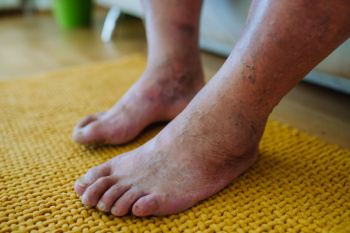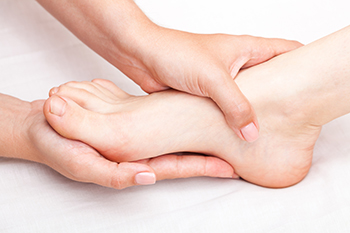
Diabetes can affect your feet in ways that are not always obvious at first. Reduced blood flow and nerve damage may lead to numbness, tingling, or a loss of sensation, making it easy to overlook injuries or irritation. You may not notice a blister, cut, or sore until it becomes infected or fails to heal. Swelling, redness, or drainage from a wound are signs that should not be ignored. Changes in skin color or temperature, especially when paired with pain or unusual smells, may indicate more serious issues like infection or poor circulation. Even dry, cracked skin can be a warning sign. Because diabetic foot problems can develop quickly and lead to serious complications, early attention is essential. Regular foot checks are important, but if you observe any of these signs or changes, it is suggested that you see a podiatrist who can help you to manage this condition.
Diabetic foot care is important in preventing foot ailments such as ulcers. If you are suffering from diabetes or have any other concerns about your feet, contact Brian Shwer, DPM from Southaven Foot Clinic. Our doctor can provide the care you need to keep you pain-free and on your feet.
Diabetic Foot Care
Diabetes affects millions of people every year. The condition can damage blood vessels in many parts of the body, especially the feet. Because of this, taking care of your feet is essential if you have diabetes, and having a podiatrist help monitor your foot health is highly recommended.
The Importance of Caring for Your Feet
Patients with diabetes should have their doctor monitor their blood levels, as blood sugar levels play such a huge role in diabetic care. Monitoring these levels on a regular basis is highly advised.
It is always best to inform your healthcare professional of any concerns you may have regarding your feet, especially for diabetic patients. Early treatment and routine foot examinations are keys to maintaining proper health, especially because severe complications can arise if proper treatment is not applied.
If you have any questions please feel free to contact our office located in Southaven, MS . We offer the newest diagnostic and treatment technologies for all your foot and ankle needs.

The condition of the feet can provide important clues about overall health. Poor circulation, often linked to diabetes or vascular disease, may cause cold feet, numbness, or slow-healing wounds. Changes in toenails, such as discoloration or thickening, can indicate fungal infections or underlying medical conditions. The arches of the feet play a role in posture and alignment, and issues such as flat feet or high arches may contribute to joint pain and imbalance. Skin conditions, including dryness, cracks, or unusual rashes, may signal nutritional deficiencies or autoimmune disorders. Persistent foot odor, beyond normal sweating, can suggest bacterial or fungal infections. If you notice any changes to your feet, it is suggested that you visit a podiatrist who can link any of these changes to possible health issues and provide treatment.
When dealing with systemic disease of the feet, it is extremely important to check the affected areas routinely so that any additional problems are caught quickly. If you have any concerns about your feet and ankles contact Brian Shwer, DPM from Southaven Foot Clinic. Our doctor will assist you with all of your podiatric needs.
Systemic Diseases of the Feet
Systemic diseases affect the whole body, and symptoms usually are displayed in the feet. This condition can make a patient’s ability to walk unbearable. Systemic diseases include gout, diabetes mellitus, neurological disorders, and arthritis.
Gout – is caused by an excess of uric acid in the body. Common symptoms include pain, inflammation, and redness at the metatarsal/phalangeal joint of the base big toe. Gout can be treated by NSAIDs to relieve pain and inflammation, and other drugs that lower the acid levels in the body.
Diabetes mellitus – is an increase in the level of blood sugar that the body cannot counteract with its own insulin. Failure to produce enough insulin is a factor in Diabetes.
Diabetes of the Feet
Diabetic Neuropathy – may lead to damaged nerves and affect the feet through numbness and loss of sensation.
Peripheral Vascular Disease – can restrict the blood flow to the feet, and often times lead to amputation of the feet.
If you have any questions please feel free to contact our office located in Southaven, MS . We offer the newest diagnostic and treatment technologies for all your foot and ankle needs.

Choosing the right footwear for weightlifting is essential for maintaining foot and ankle stability during heavy lifts. Weightlifting shoes differ from regular sneakers by offering a firm, non-compressible sole and an elevated heel. This enhances ankle mobility and allows for a deeper squat position, while keeping the foot stable. A proper lifting shoe minimizes excessive movement, which reduces the risk of rolling an ankle or placing undue pressure on the toes. Standard athletic shoes with soft soles can create instability, increasing the likelihood of foot fatigue and misalignment. Shoes with a secure strap system can further support the midfoot, preventing unnecessary shifting during lifts. People with existing foot concerns, such as flat feet or limited ankle mobility, may benefit from custom orthotics within their weightlifting shoes to ensure proper alignment. A podiatrist can assess your foot structure and gait mechanics to help determine which footwear best promotes stability and reduces strain on your feet. If you experience foot pain after a weight-lifting workout, it is suggested that you schedule an appointment with a podiatrist for an exam and diagnosis.
Getting the right shoe size is an important part of proper foot health. Seek the assistance of Brian Shwer, DPM from Southaven Foot Clinic. Our doctor will provide the care you need to keep you pain-free and on your feet.
Getting the Right Shoe Size
There are many people who wear shoes that are the incorrect size, negatively affecting their feet and posture. Selecting the right shoes is not a difficult process, so long as you keep several things in mind when it comes to choosing the right pair.
As our feet hold our body weight and keep us moving, it is important to treat them right. Picking the right pair of shoes can provide your feet comfort and mobility without pain.
If you have any questions, please feel free to contact our office located in Southaven, MS . We offer the newest diagnostic and treatment technologies for all your foot care needs.